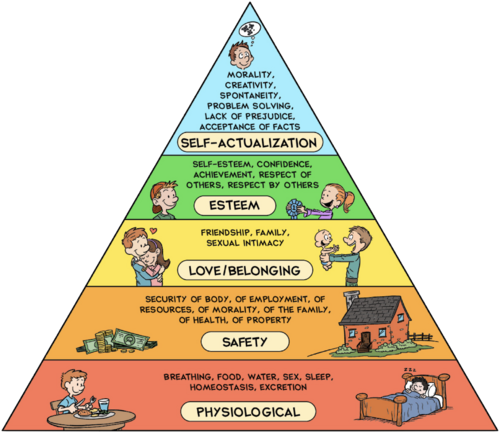Need-Based Theories of Motivation
(→Maslow's Hierarchy of Needs) |
(→Maslow's Hierarchy of Needs) |
||
| Line 35: | Line 35: | ||
* Self-actualisation needs | * Self-actualisation needs | ||
| − | [[File:Maslow_1.png| | + | [[File:Maslow_1.png|thumb|center|500px|Maslow's Hierarchy of Needs]] |
=== Alderfer's ERG Theory === | === Alderfer's ERG Theory === | ||
Revision as of 12:09, 28 February 2018
Contents |
Abstract
Project teams are comprised of team members with diverse backgrounds, expectations and individual objectives. The overall success of a project depends on the project team's commitment, which is directly related to their level of motivation.[1] These are able to affect all aspects of the result that will be achieved by a project, including a direct impact to the constraints of scope, time and cost.
Motivation encompasses the psychological forces[2] within a person that determine:
- The direction of a person's behaviour in an organisation, which refers to the many possible behaviours a person could engage in.
- A person's level of effort, which refers to how hard people work.
- A person's level of persistence in the face of obstacles, which refers to whether people keep trying or give up.
Motivating in a project environment involves creating an environment to meet project objectives while providing maximum satisfaction related to what people value most.[1] This may include:
- Pay
- Job security
- Autonomy
- Responsibility
- The pleasure of doing interesting work
- A feeling of accomplishment
- Recognition
Knowing this, it is in the project manager's best interest to understand the demotivation cause in order to drive toward project success though the creation and maintenance of a motivating environment for all members of the team.[3]
This article focuses on need-based theories of motivation which form the basis of in which way project managers help people to satisfy their needs at work. It exemplifies the application of these theories and mentions the limitations.
Need Theories
A need is a requirement or necessity for survival and well-being. The basic premise of need theories is that people are motivated to obtain outcomes at work that satisfy their needs. Need theories suggest that to motivate a person to contribute valuable inputs to a job and perform at a high level, a project manager must determine what needs the person is trying to satisfy at work and ensure that he or she receives outcomes that help to satisfy those needs in return for performing at a high level and helping the organisation achieve its goals.[2]
There are several need theories, of which Maslow's Hierarchy of Needs, Alderfer's ERG Theory and McClelland's Need Theory is described briefly below. These theories may be hard to use directly, but give the project manager an understanding of how he or she has to take action in order to create a motivating environment which fulfil people's needs.
Maslow's Hierarchy of Needs
- Physiological needs
- Safety needs
- Belongingness needs
- Esteem needs
- Self-actualisation needs
Alderfer's ERG Theory
- Existence needs
- Relatedness needs
- Growth needs
McClelland's Need Theory
- Need for achievement
- Need for affiliation
- Need for power
Application
Limitations
Annotated bibliography
References
- ↑ 1.0 1.1 Project Management Institute. (2013). A Guide to the Project Management Body of Knowledge (PMBOK® Guide) (5th ed.).
- ↑ 2.0 2.1 Jonas, G. R. and George, J. M. (2015). Essentials of Contemporary Management (6th ed.).
- ↑ Peterson, T. M. (2007). Motivation: How to increase project team performance. Paper presented at PMI® Global Congress 2007. https://www.pmi.org/learning/library/motivation-increase-project-team-performance-7234
